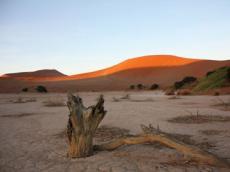|
|
TODAY.AZ / World news
Uzbekistan to take in talks on anti-desertification measures
12 April 2013 [10:51] - TODAY.AZ
 By AzerNews
By AzerNewsUzbekistan will host a roundtable on measures related to combating desertification and land degradation as well as improving the condition of land and water conservation.
The event will be held during a visit by Executive Secretary of the UN Convention to Combat Desertification (UNCCD), Luc Gnacadja, to the Central Asian state in late April.
The UNCCD came into force in 1996 and has been ratified by 195 countries. Uzbekistan ratified the convention in October 1995.
Desertification, a process in which productive land gradually turns into a desert, is currently one of the serious environmental issues caused by both natural and anthropogenic factors.
According to scholars' estimates, one-fifth of the world's population is currently threatened by the impact of desertification. In Central Asia alone, 8,000 to 10,000 square kilometers of desert emerges every year.
According to experts, a combination of factors, including global warming, climate change and change in rain patterns, are the main reasons of desertification. However, other main man-made reasons of desertification include the overexploitation of natural resources, overgrazing or intensive farming and the use of chemicals in cotton harvesting.
Among other climatic factors of desertification is windy weather, which is inherent to arid territories like the ones in Uzbekistan.
More than 85 percent of the Uzbek territory consists of deserts and semi-deserts.
The lands of Bukhara, Navoi, Kashkadarya and Fergana regions suffer from soil degradation. Water erosion strongly affects the lands of Surkhandarya, Tashkent, Namangan and Andijan regions as well.
During the past 15 to 20 years, there has been an extensive degradation of pasture land, due to the unbalanced use of pastures in cattle breeding, lack of maintenance of pastures and other human activities in Uzbekistan. The Aral Sea region, especially Karakalpakstan, deserves special attention in the efforts to prevent and control land degradation.
Up to 46 percent of irrigated lands of Uzbekistan are exposed to salinization. High salinization is a major environmental problem. Likewise, vegetation degradation is caused by livestock overgrazing, felling of trees for firewood, discharge of drainage water into desert depressions and excessive watering.
Some other human factors contributing to land degradation in Uzbekistan are the drying of the Aral Sea and exposure of toxic materials that have been deposited on the former sea-bed, discharge of toxic substances from industry and cities to the water and the air.
Desertification should be promptly addressed and combated. The World Day to Combat Desertification and Drought was declared by the UN General Assembly in 1994 and since that time has been annually celebrated on June 17 to attract public attention and to promote public awareness of the issues related to land degradation, desertification and effects of drought.
Once desertification has occurred, it is extremely expensive or impossible to reverse. However, there is always hope for resolving these problems.
Sustainable land use can address human activities such as overgrazing, overexploitation of plants, trampling of soils and unsustainable irrigation practices that cause desertification.
All measures that protect soils from erosion, salinization and other forms of soil degradation effectively prevent desertification. Protection of the vegetative cover from wind and water erosion can be a major tool for the prevention of desertification.
Management strategies include measures to promote human activities such as use of traditional water-harvesting techniques, water storage, and diverse soil and water conservation measures. Integrated land and water management are key methods of desertification prevention.
URL: http://www.today.az/news/regions/121313.html
 Print version
Print version
Views: 1468
Connect with us. Get latest news and updates.
See Also
- 26 August 2025 [23:51]
Moscow introduces QR code system to monitor migrants and migration status - 26 August 2025 [23:33]
Nongshim unveils K-Pop inspired noodle line with supernatural twist - 26 August 2025 [22:50]
Mitsubishi withdraws from offshore wind plans in Japan - 26 August 2025 [21:22]
Rheinmetall to build two military plants in Bulgaria - 26 August 2025 [20:50]
China building largest EV charging network - 26 August 2025 [20:21]
Switching to electric vehicles significantly reduces total CO? emissions - 26 August 2025 [09:00]
US probes Honda cars over engine failure - 26 August 2025 [08:00]
Sweden to sell Thailand four Saab Gripen jets - 25 August 2025 [23:30]
Hyundai and Genesis top 2025 J.D. Power tech rankings - 25 August 2025 [22:23]
LG Chem expands its portfolio for more sustainable future
Most Popular
 Washington plans to provide 20 tons of plutonium for civilian nuclear use
Washington plans to provide 20 tons of plutonium for civilian nuclear use
 Radicals have invented new enemy for Iran
Radicals have invented new enemy for Iran
 Research Center: Peace agreement opens historic new page for S Caucasus
Research Center: Peace agreement opens historic new page for S Caucasus
 President Ilham Aliyev receives UK Minister of State for Europe and North America
President Ilham Aliyev receives UK Minister of State for Europe and North America
 Human remains discovered in liberated A?d?r? district
Human remains discovered in liberated A?d?r? district
 Court in Baku continues trial of Armenian-origin individuals accused of war crimes
Court in Baku continues trial of Armenian-origin individuals accused of war crimes
 ANAMA: Nearly 1,500 hectares made safe in demining push
ANAMA: Nearly 1,500 hectares made safe in demining push
